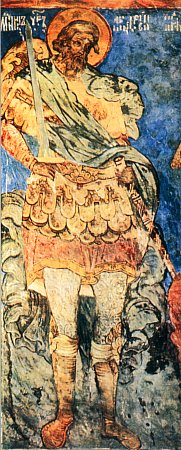
The Martyr Andrew (Andreios) Stratelates
Commemorated on August 19
The Martyr Andrew (Andreios) Stratelates was a military commander in the Roman armies during the reign of the emperor Maximian (284-305). They loved him in the Roman armies because of his bravery, invincibility and sense of fairness. When a large Persian army invaded the Syrian territories, the governor Antiochus entrusted Saint Andrew with the command of the Roman army, giving him the title of "Stratelates" ("Commander-General"). Saint Andrew chose for himself a not large detachment of brave soldiers and proceeded against the adversary. His soldiers were pagans. Saint Andrew himself had still not accepted Baptism, but he believed in Jesus Christ. Before the conflict he persuaded the soldiers, that the pagan gods – were demons and unable to render help in battle. He proclaimed to them Jesus Christ, the omnipotent God of Heaven and earth, giving help to all believing in Him. The soldiers went into battle, calling on the help of the Saviour. The not large detachment set to flight the numerous host of the Persians. Saint Andrew returned from the campaign in glory, having gained a total victory. But the jealous reported on him to the governor Antiochus, that he – was a Christian, converting to his faith the soldiers under his command. Saint Andrew was summoned to trial, and there he declared his faith in Christ. For this they subjected him to torture. He reclined himself upon a bed of white-hot copper, but as soon as he recoursed to help from the Lord, the bed became cool. They crucified his soldiers on trees, but not one of them renounced Christ. Having locked the saints away in prison, Antiochus dispatched the report of charges on to the emperor, being undecided on whether to impose the death sentence upon the acclaimed victor. The emperor knew, how the army loved Saint Andrew, and fearing a mutiny, he gave orders to free the martyrs, and secretly he ordered that each under some pretext be executed separately.

Having been set free,
Saint Andrew together with his fellow soldiers went on to the city of Tarsus.
There the local bishop Peter and bishop Nonos of Beroeia baptised them. Then
the soldiers proceeded on to the vicinity of Taxanata. Antiochus wrote a letter
to the governor of the Cilicia region Seleukos, that under the excuse of
deserting their military standards he should overtake the company of Saint
Andrew and kill them. Seleukos came upon the martyrs in the passes of Mount
Tauros, where they were evidently soon to suffer. Saint Andrew, calling the
soldiers his brothers and children, urged them not to fear death. He prayed for
all who would honour their memory, and besought the Lord to send a curative
spring on the place where their blood would be shed. At the time of this prayer
the steadfast martyrs were beheaded with swords (+ c. 302). During this time a
spring of water issued forth from the ground. Bishops Peter and Nonos, with
their clergy secretly following the company of Saint Andrew, buried their
bodies. One of the clergy, suffering for a long time from an evil spirit, drank
from the spring of water and at once he was healed. Reports about this spread
amongst the local people and they started to come to the spring, and through
the prayers of Saint Andrew and the 2593 Martyrs suffering with him, they
received gracious help from God.
© 1996-2001 by translator Fr. S. Janos.